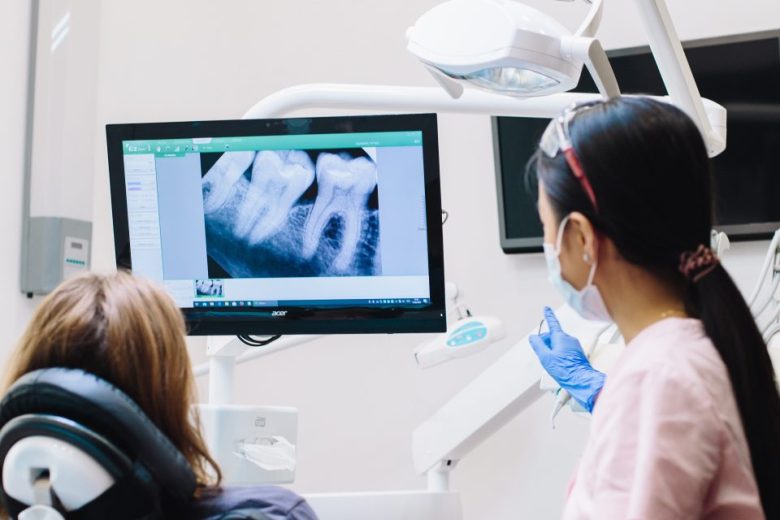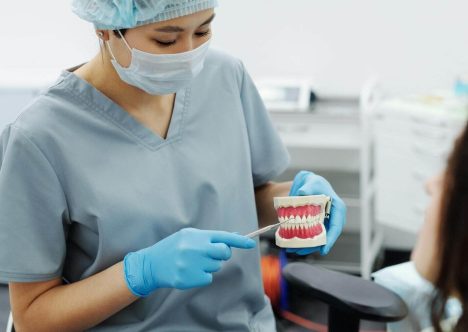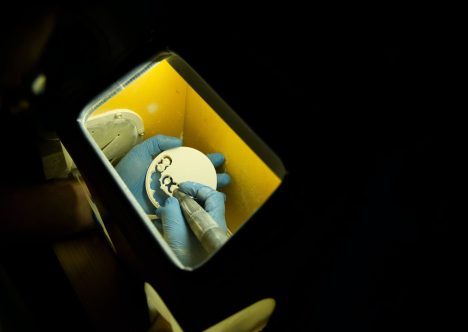Dental implants are screw-like metal posts surgically inserted in the jawbone to serve as artificial tooth roots for lost teeth. The implants do not slip, generate noise, or cause bone injury since the titanium in the implant bonds with the jawbone. They are a viable option for ill-fitting dentures or bridgework. Traditional implants are also an excellent choice when the absence of natural tooth roots precludes the building of dentures or bridgework.
How a dental implant procedure is carried out depends on the implant type and your jawbone condition. This may entail several dental procedures to ensure that your bone heals properly around the implant and provide firm support for your replacement teeth. Because bone regeneration takes time, dental implant surgeries can take months to complete.
Initial Evaluation
All dental implant procedures begin with an initial evaluation. Our highly skilled team at Precision Oral Surgery will first conduct a thorough evaluation to determine the best dental implant procedure for your condition. This evaluation includes:
- A comprehensive dental exam – You may have dental X-rays and 3D images taken to allow more precise placement of implants.
- Review of medical history – Inform us of any medications you take, including prescription and over-the-counter medications and supplements. Depending on your condition or orthopedic implants, you may require antibiotics before the surgery to avoid infection.
- Treatment plan – We will customize a specific treatment plan to suit your needs. This plan considers factors such as how many teeth need replacing and the jawbone and remaining teeth condition.
The planning process for dental implant treatment may involve many specialists, including an oral and maxillofacial surgeon (who specializes in the diagnosis and treatment of conditions affecting the mouth, jaw, and face), a periodontist (who specializes in treating structures that support the teeth, such as bones and gums), prosthodontist (who designs and fits artificial teeth) and occasionally, an ENT specialist.
Tooth Extraction
If any damaged teeth need replacing, we will remove them before the dental implant surgery. Depending on the situation, tooth extractions can be carried out simultaneously with implant placement. We will discuss anesthesia options to control pain during surgery, including local anesthesia, IV sedation, and general anesthesia.
Removing damaged teeth shouldn’t take long unless they’re badly fractured. You will only feel a slight tug and pressure while the teeth are extracted. Make sure to follow the aftercare instructions we provide to avoid complications after tooth extractions.
Bone Grafting
If your jawbone is not thick or strong enough, you may need bone grafting before proceeding with the dental implant procedure. Since the powerful chewing action of the mouth exerts significant pressure on the bone, not having a strong bone to support the implants will result in implant failure. Bone grafting is a surgical procedure that utilizes transplanted bone to repair or build diseased or damaged bone. Bone grafts help create a more solid base for implants.y
There are several types of bone graft materials used to add extra bone. Options include a natural bone graft, such as the bone from another part of the body, or a synthetic bone graft, such as bone-substitute material that can support new bone growth. Your surgeon will determine the type that will work best for you.
The transplanted bone may take some time to grow enough new bone to accommodate dental implants. In some cases, especially when only minor bone grafting is needed, you can simultaneously have both bone grafting and implant surgery.
Dental Implant Placement
During your implant placement surgery, we will make an incision in your gum and drill holes into the bone where the implant post is to be placed. Since the post will serve as an artificial tooth root, it is generally implanted deep into the bone. After the implant placement, a partial, temporary denture is placed. This temporary crown can easily be removed for cleaning purposes or while sleeping.
Once the implant post is placed in your jawbone, osseointegration begins. Osseointegration is where the jawbone grows and fuses with the dental implant’s surface. The process can take anywhere between six weeks to six months and helps provide a strong base for your new artificial tooth.
Abutment Placement
After the osseointegration process, you may need additional surgery to place the abutment, the piece that connects the crown to the implant. This minor surgery is generally performed with local anesthesia in an outpatient setting. We will reopen the gum, attach the abutment to the implant, and then close the gum tissue around the abutment.
In certain cases, the abutment and the implant post are placed simultaneously, eliminating the need for additional surgical procedures. Since the abutment extends over the gum line and stays that way until the tooth prosthesis is complete, some people prefer having the abutment placed in a separate procedure. After the abutment is placed, your gums need to heal for about two weeks before placing the artificial tooth.
Permanent Crown Placement
Once your gums heal, we will create and place your permanent dental crown. You can choose to have replacement teeth that are removable, fixed or a combination of both:
- Removable – This is similar to a conventional removable denture of artificial teeth surrounded by plastic gum. It is mounted on a metal frame attached to the implant abutment and can easily be removed for repair or daily cleaning.
- Fixed – This type requires an artificial tooth to be permanently screwed or glued down with cement onto an individual dental implant. The tooth can’t be removed for cleaning or during sleeping. Generally, each prosthetic tooth is attached to its dental implant. Since dental implants are strong, several teeth can be replaced by a single implant if they’re bridged together.
The entire process can take six to nine months or more. Much of that time is dedicated to bone healing and waiting for new bone growth in the jaw. Depending on your condition, the specific procedure, and the materials used, some stages can sometimes be combined.
After The Procedure
Whether you have the dental procedure in one stage or multiple stages, you may experience some discomfort that is typical with any oral surgery, including:
- Swelling of your gums and face
- Bruising of your skin and gums
- Pain at the implant site
- Minor bleeding
These discomforts can be overcome with over-the-counter pain medications, such as ibuprofen or antibiotics. If the swelling or discomfort worsens in the days following the surgery, contact us immediately. We will also advise you to consume soft food after each stage of surgery to allow the surgical site to heal.
Aftercare
The success of your implants is contingent on your efforts to maintain oral hygiene and follow aftercare instructions. For example, the bone may fail to fuse properly to the implant if you smoke, as this habit contributes to implant failure and complications. In such instances, the titanium implant is removed, and you will be required to wait for about three months to try the dental surgery again.
You can help your dental work last longer by following the below steps:
- Practice good oral hygiene – Just as with your real teeth, keep implants, crowns, and gum tissue clean with regular brushing and flossing. According to the American Academy of Periodontology (AAP), proper dental hygiene and care are vital to prevent peri-implant diseases and ensure lasting implant success.
- See your dentist regularly – Commit to regular dental checkups to ensure oral health and proper functioning of your implants.
- Avoid damaging habits – Refrain from chewing hard items like ice or hard candy, which can break your crowns or natural teeth. Avoid tobacco and caffeine products that can stain your teeth. Get dental treatment if you grind your teeth.
Complications Of Dental Implants
According to the American Academy of Implant Dentistry (AAID), dental implants have a success rate of around 95%. However, dental implant surgery carries inherent risks like any surgical procedure. However, complications are uncommon, and they’re usually minor and treatable when they do arise.
Some of the complications of dental implants include:
- Infection at the implant site
- Damage or injury to surrounding structures, such as adjacent teeth and blood vessels
- Nerve damage causes pain, numbness, or tingling in your natural teeth, gums, chin, and lips.
- Sinus problems (when the dental implants are inserted into the upper jaw bone juts into one of your sinus cavities)
Who Can Have Implants?
Dental implants are a great option for tooth loss and tooth decay. They are a more stable and convenient alternative to traditional dentures as they integrate into the bone structure. Generally, anyone with good general health can be considered for this procedure.
Ideal candidates must be in good general health and free from medical conditions such as uncontrolled diabetes or a weakened immune system. They must also have a healthy mouth with no untreated tooth decay or periodontal disease. Patients with gum disease will be treated for the condition before being considered for implant surgery.
If you lost bone in your jaw, you might still be a suitable candidate for dental implants. Bone grafting will be used to grow additional bone to sustain your dental implants.
If you want dental implants to achieve healthy, permanent teeth, consult an oral specialist at Precision Oral Surgery today. We are located in Greeley and Thornton, Colorado.






